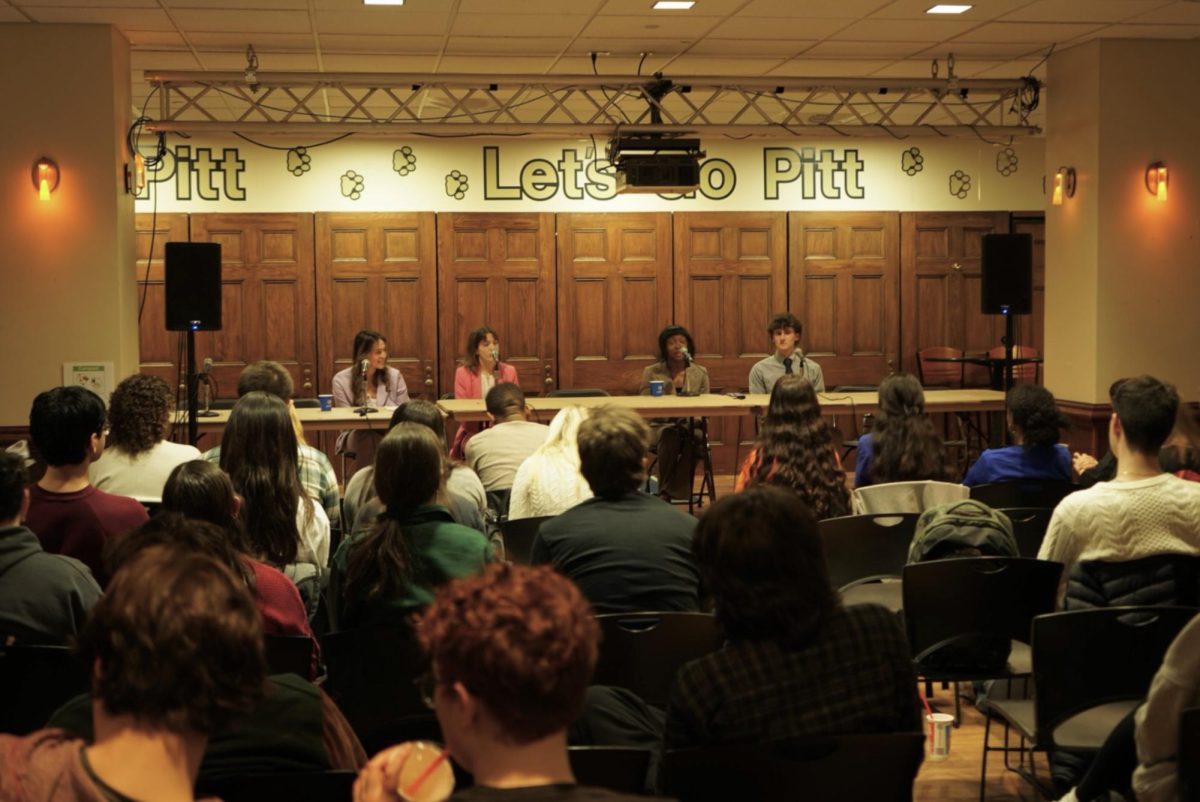SGB candidates debated key policy initiatives, including the future relationship between the board and University administration during the presidential debate on Tuesday night at Nordy’s Place. Undergraduate students will be able to cast their votes in two weeks on March 11th.
Four presidential candidates are running on two distinct campaigns– the Forward ticket and the H2Pinsky-Budike ticket. Mercy Akanmu is campaigning alongside VP candidate Evan Levasseur, a current board member, for the Forward ticket. Marley Pinsky, current Committee and government relations chair, is campaigning alongside Olivia Budike, VP candidate and current facilities, transportation and technology chair, for the H2Pinsky-Budike ticket.
To begin the debate, the candidates discussed their top priorities if elected. Akanmu stated her commitment to diversity on campus and ensuring SGB has a greater amount of funding to fulfill allocations requests next school year.
“We already have plans to ensure that clubs are able to get more money next year and make sure we have more minority voices on campus,” Akanmu said. “We’re going to outreach to the cultural organizations, go to their meetings and show them that they have a place here.”
Akanmu highlighted her commitment to bringing higher levels of diversity to SGB and the larger student body.
“I am a minority pushing for minority voices,” Akanmu said. “As a Black woman myself, I understand we don’t have a lot of representation for underrepresented voices on campus. The way I plan to fix this is making sure we have more of these people on this campus.”
One of Pinsky’s top priorities is transparency from the board and University administration to the student body about allocations funding, which is one of her campaign’s main focus points.
“We can’t be demanding transparency from administration if SGB is not mirroring that behavior,” Pinsky said. “No matter if we say we have an open door, we need to make sure we’re doing more outreach and more collaboration to learn how we can be using resources despite cuts to federal funding.”
Pinsky stressed her “fresh perspective” and higher commitment to student voices over partnering with administration to solve issues “behind closed doors”.
“We’ve gone outside our traditional roles and gone outside of the box of what’s been expected of us as chairs to do… [and] not just coupled with admin,” Pinsky said. “We’re fully prepared to speak and work with the administration.”
In response, Akanmu said she is committed to collaborating with administration privately and her previous experience as a board member means she “knows the process,” which sets her apart from Pinsky.
“We can talk all we want about making sure we’re firm with administration, but the reality of the situation is that’s not how we get things done,” Akanmu said. “The way we get things done is by advocating in a private setting because when we do it in public [administration doesn’t] like it.”
Akanmu said she intends to increase board outreach and give all clubs a board liaison in order to better support equity towards student organizations in the allocations process.
“What we’re going to focus on is making sure board members also have a voice and opinion,” Akanmu said. “We’re going to go out to the clubs–going out to them, not making them come to us.”
Budike responded to questions about allocations and said the H2Pinsky-Budike ticket will focus on supporting student clubs through “other avenues” to find funding.
“Finding funding for organizations without the risk of raising tuition is so important,” Budike said. “It’s about being able to be responsive with those organizations.”
Candidates were asked how they would handle allocation requests from organizations that have “opposing beliefs or values” to them if they are elected to president.
“We should not be discriminating based on what a club is representing. That would be undemocratic,” Pinsky said “I would simply put my beliefs aside when dealing with funding for clubs.”
Akanmu echoed Pinsky’s sentiment, claiming her and Levasseur will focus on what the money will be used for over the requesting organization’s beliefs.
“We’re just going to push that people ignore what kind of organization they are and focus on the facts,” Akanmu said. “If they do everything the right way and take the right steps, we’ll fund them.”
When asked about safety initiatives as president, Pinsky discussed Budike’s initiatives, including improvements to Saferider and expanding the presence of wellness lockers in public areas.
“Currently [Budike’s] has worked to improve Saferider a lot this past year,” Pinsky said. “We intend to expand [wellness lockers] to residential halls and provide free drug tests and narcan to students.”
Levasseur cited the recently formed anti-hate ad-hoc committee as his answer to improving the safety of all minorities on campus.
“[The anti-hate ad-hoc] is a way for students to come for any issue–I left the scope of this committee very broad so it could be open to all students,” Levasseur said. “The purpose of this committee is to bridge the gap between students and administration.”
Akanmu highlighted her and Evan’s initiatives to improve dining services on campus and the need for initiatives to be delegated to individual board members.
“We want to make sure that food safety is really pushed on this campus so we don’t see any more pictures of bugs in our food,” Akanmu said. “We’ll make sure we uplift the voices of people without stepping on each other’s toes.”
In response, Pinsky stressed the need for collaboration between board members and how a lack of resources is the biggest cause of housing and dining concerns on campus.
“I think one of the biggest issues at Pitt is that we don’t have consolidation of resources,” Pinsky said. “Collaboration does not mean stepping on toes.”


